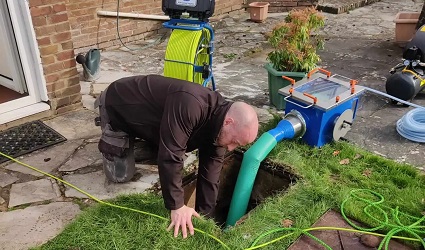Blocked drains are a nuisance and can be even more frustrating when they seem to occur repeatedly without an obvious cause. If this issue is causing you stress, you might be wondering why your drains keep blocking and, more importantly, how you can prevent future blockages. While some causes can be addressed through changes in how you use your drains, others might require the expertise of a professional plumber.
What Causes Blocked Drains?
Various factors can lead to blocked drains, and understanding these can help you address the root of the problem. The specific cause often depends on the location of the drain.
Kitchen Sink
In the kitchen, blocked drains are usually caused by food and drink particles. Fats, oils, and grease (FOG) are particularly notorious for clogging pipes. When these substances are hot, they’re liquid and easily poured down the drain. However, as they cool, they solidify and can become lodged in the pipes. Over time, this buildup can lead to significant blockages.
Other kitchen debris such as food waste, coffee grounds, and foreign objects can also contribute to blockages. Combined with grease, these materials can severely affect the drainage system.
Signs of a Blocked Kitchen Drain:
- Unpleasant odours coming from the drain
- Gurgling or bubbling sounds when the drain is used
- Slow draining sink
- Water backing up through the drain
How to Fix Recurrent Kitchen Blockages
If the blockage is near the sink, you can often address it yourself. Pouring boiling water down the drain can liquefy grease, allowing it to move further down the pipes. For more stubborn blockages, a mixture of boiling water, baking soda, vinegar, and dish soap can be effective. Soda crystals are another option for tackling typical blockages.
Preventing Kitchen Blockages
This involves being mindful of what goes down the sink. Avoid pouring fats, oils, and grease down the drain, and instead dispose of them in the trash. Scrape food particles off of your plates before washing them, and wipe greasy pans with paper towels before cleaning them in your sink.
If frequent blockages persist, it might be time to consult a professional. Repeated issues could indicate a more serious problem within the drainage system, such as damaged pipes, which a plumber can diagnose with a CCTV survey.
Bathroom Sink, Shower, and Toilet Drain
In the bathroom, multiple drains can be prone to blockages. Toilets often get blocked when unsuitable items are flushed. Only toilet paper should be flushed; items like wet wipes, even those labelled “flushable,” cotton wool, and sanitary products can cause blockages.
Bathroom sinks, baths, and showers usually get blocked by a combination of hair and soap, which clump together and obstruct water flow.
Signs of Blocked Bathroom Drains:
- Unpleasant smells from the drains
- Overflowing or overfilled toilet after flushing
- Slow draining sink, bath, or shower
- Gurgling noises when draining
How to Fix Bathroom Blockages
For toilets, a mix of boiling water, baking soda, vinegar, and dish soap can sometimes clear blockages. If this doesn’t work, try using a plunger or call a professional plumber.
To clear hair from drains, use the same mixture of hot water, baking soda, vinegar, and dish soap. If this fails, tweezers or a drain snake can help remove the clog.
Preventing Bathroom Blockages
Prevent bathroom blockages by only flushing toilet paper. Use hair catchers in plugholes to prevent hair from entering the drains. These devices catch hair while allowing water to drain and can be easily cleaned after each use.
Outside Drains
Outside drains usually get blocked by leaves specifically during autumn. Leaves, mud, and other debris can accumulate and cause clogs. Tree roots are another common problem. Roots are attracted to the water in your drains and can travel long distances to reach them. Even a small crack in a pipe can allow roots to enter and grow, eventually causing a blockage.
How to Fix Blocked Outside Drains
If leaves and mud are the culprits, removing the drain cover and using a drain rod can break up the clog. For tree root ingress, a professional drainage expert is needed. They can conduct a CCTV survey to identify the issue and use specialised tools to remove the roots and repair the pipes.
The Bottom Line
Recurrent blockages in your drains can be both time-consuming and unpleasant. Often, the cause is a buildup of debris in the pipes, but sometimes the issue may be more complex, requiring professional intervention. Regular maintenance and always being mindful as to what you put down your drains will help prevent these issues from occurring. If in doubt, always consult a professional to ensure your drainage system is in good health.
For help with your drainage issues, contact Optimum Drains today!

